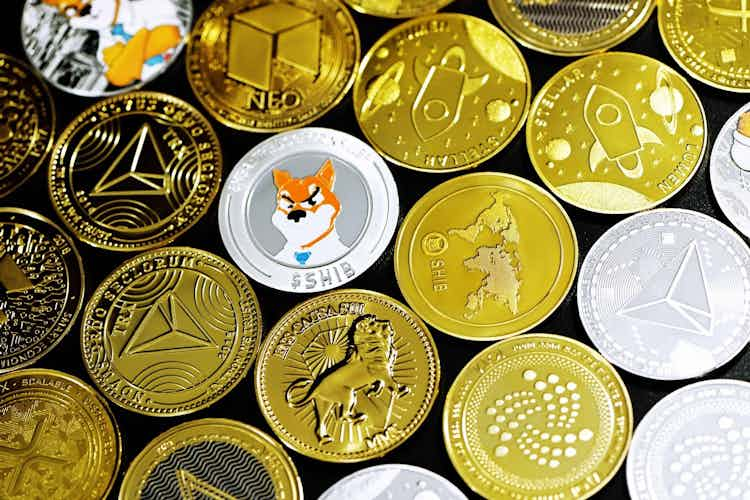There are thousands of cryptocurrencies in the crypto market ecosystem. That's exceptionally vast for an investment class based upon cryptography - the art of solving complex puzzles. However, given the enormous market capitalisation of many cryptocurrencies, this asset class is becoming too big to ignore.
While that by no means suggests you should invest their hard-earned money in it, it does mean you should at least consider it. For instance, more and more financial institutions are looking at ways to invest in this asset class - so often characterised by volatility and the potential for huge returns.
As a result, cryptocurrency continues to be a hot topic in the investment community. It also remains controversial. Commentators consistently debate what makes an investable cryptocurrency versus what does not. Sometimes the subsequent hype is reflected in an asset experiencing a bull run, while others have a swift fall from an all-time high.
If you are considering investing in any cryptocurrencies, be sure only to invest what you can afford and in a way appropriate for your risk profile. Remember, investing in this asset class can be exceptionally risky. These assets often come with a harsh disclaimer on trading platforms for a good reason - you could stand to lose the entire value of your initial investment.
Discover the UK's leading investment platforms, whatever your investment goals. Click on a provider below to get started!
What is cryptocurrency?
A cryptocurrency is a digital asset, often held in a digital wallet. You can use cryptocurrency to pay for goods or exchange it for other digital assets. Most cryptocurrencies are based upon blockchain technology that records all transactions in a distributed ledger, like the Ethereum blockchain. Web3 - the newest "version" of the world wide web - uses blockchain technology to help facilitate payments. One of the increasingly popular use cases for crypto coins is to purchase items in the metaverse - a world powered by virtual reality technology.
The key characteristics of cryptocurrencies that make them an attractive investable asset to many are that they are:
- Decentralised finance, so not beholden to Government action or monetary policy,
- Anonymous, as transactions are recorded on the blockchain without the use of names and addresses, simply private keys
- A good means to add diversification to a portfolio
Cryptocurrencies should not be confused with other digital assets, however. For example, non-fungible tokens (NFTs) run on the same blockchain technology as cryptocurrencies. But they aren't the same thing. Instead, NFTs are usually based upon underlying assets like art, wine, or cars and have a specific NFT marketplace.
What is the best crypto to invest in this year?
In 2023, the future of the crypto industry will be impacted by many market influences, some that we previously saw in 2022 - such as bear markets being increasingly common - and other forces that will be new, such as increased regulation.
With the potential for continued disruption due to global economic headwinds and more specific cryptocurrency downside risk, 2023 looks set to have as uncertain a backdrop as 2022. In addition, many foresee a 'crypto winter' due to 2023 looking likely to experience yet more global inflation. That said, inflation's rate of increase will hopefully reduce before it eventually flatlines and reduces to more manageable levels.
What was interesting to see during 2022's heightened inflationary periods was that while it has dogged all financial markets and therefore driven investors to withdraw funds from such a speculative asset as crypto, there were times in 2022 when prices of Bitcoin and others ' stabilised'. Most notably in the 3rd quarter, even when other markets were in turmoil.
However, in the near term, it will be interesting to see how the court trial of FTX founder Sam Bankman-Fried will plague crypto prices, with 'SBF" charged with the most significant financial fraud in history.
All this makes crypto’s roadmap particularly uncertain. For now, though, let's delve into some of the most popular cryptocurrencies or crypto assets, look at their competitive advantages in 2023, and why they could be an option for your investments.
Bitcoin (BTC)
Elon Musk's once favourite cryptocurrency must be up for debate in any crypto discussion. This top crypto has the largest market cap of any on the market and was the first cryptocurrency ever established. While a new cryptocurrency crops up daily, Bitcoin still sees a large, regular trading volume and thus is too big to ignore.
One of the main advantages of Bitcoin, in particular, is the fact that it has a limited supply. There will only ever be 21 million Bitcoin tokens in existence. When something is limited, it always has better potential to store value than something more common. Digital currencies may be new, but the finite supply theory is simple, traditional economics.
Ethereum (ETH)
Ether tokens are recorded across the Ethereum network. The blockchain technology behind this coin was intended to help support the ability of smart contracts that are ‘tamper proof’. As a result, for those unsure of what true value digital currencies have, Ethereum does technically have a use. While it has become a competitor to Bitcoin, with investors simply buying it to hold in their portfolio, the power that the Ethereum network has through using blockchain technology to support financial contracts and apps is enormous. In addition, it has sought to rectify issues with its rising cost of transmission and too much traffic by using Polygon - a digital 'scaling solution' that looks to reduce complexities which add to costs and transaction times.
Despite the much-anticipated move from the energy-intensive proof of work technology to a proof of stake technology through a series of upgrades in 2022, it was plagued by the market-wide sell-off like many of its competitors. However, it is still an interesting option because many other cryptocurrencies, including the quirkily named digital currency Shiba Inu (SHIB) operate on the Ethereum network.
Cardano (ADA)
Cardano was established by the same gentleman that founded Ethereum, Charles Hoskinson. However, it is currently quite different from Ethereum.
Perhaps down to its shared co-founder, Cardano can help create smart contracts. That's because it can be 'programmed' so developers can establish decentralised applications (or 'dapps') with infinite uses. Importantly, though, it is highly secure thanks to being based on its blockchain. As a result, that could have hugely positive ramifications for many companies and how they conduct many of their business dealings. Furthermore, as its blockchain technology is more widely understood and adopted, it could become of more significant interest to many digital asset investors.
XRP (XRP)
XRP is a cryptocurrency established by the FinTech firm Ripple. One of its main advantages, particularly over cryptocurrency heavyweight Bitcoin, is that XRP is cheaper and faster than Bitcoin. One of the reasons is that it has more coins on the market, with a billion XRP coins pre-mined when launched, compared to Bitcoin's 21 million capped supply. In addition, users tend to like XRP due to its lower transaction costs.
However, detractors do not like that Ripple owns and operates it. Due to such an ownership structure, the impact of being decentralised is immediately less. To some investors, though, that could be an advantage.
Polkadot (DOT1)
Polkadot is an important cryptocurrency to consider when looking at the potential power of the asset class as a whole. That is because Polkadot is looking to connect blockchains that support different digital currencies - for example, Bitcoin and Ethereum run on different networks - so that they can 'talk' to each other.
It is potentially, therefore, a significant development. It means that instead of working separately from one another, making transferring one for another difficult, they can be used together. In doing so, cryptocurrencies could be even more potent as all their strengths can be used together, creating a more seamless environment for digital currencies to operate within. Above all, its biggest promoters say it also adds an extra layer of security, making the arena safer.
Solana (SOL1)
Solana burst onto the scene in 2019 and is an increasingly popular cryptocurrency thanks to its fast and secure blockchain network, which also appears to be scalable. That's incredibly important for developers looking to use blockchain networks to make smart contracts. Solana's speed is also matched with low fees for each transaction, yet it already has billions of users. Usually, fees increase with the number of users as more investment is needed to enable the network to service the increased usage. However, Solana has managed to buck that trend.
That said, those using Solana hardware will find it costly to buy if wanted for its decentralised apps capabilities. Additionally, many cryptocurrency commentators criticise Solana's general approach to being decentralised. A large amount of its supply is currently believed to be held by startup investors and venture capitalists. When only a few owners hold a high proportion of a company, it is less decentralised than it could otherwise be.
Tether (USDT)
No list of potential cryptocurrency investments is complete without at least one stablecoin. A stablecoin looks to have the best of both digital and traditional currencies, i.e. crypto's returns without the volatility. They achieve that by pegging their worth to a traditional fiat currency or another underlying asset. Therefore, it is meant to be more stable in terms of market movements and, hopefully, more investable.
Tether is meant to be backed by one US dollar. As a result, it gives holders the comfort and confidence that their holdings are more secure. Some investors in Tether are also comforted by the more transparent nature of pricing and less market fear. As a result, it is now one of the world's most popular currencies. However, its main disadvantage is that it instantly becomes less decentralised when pegged to a fiat currency.
ApeCoin (APE)
ApeCoin is an example of why the NFT market and cryptocurrencies are often referred to interchangeably. While still different asset classes, ApeCoin allows the easy purchase of items and services in the metaverse, which could arguably be crucial to see the true potential for virtual reality technology. Events, gaming, and merchandise can all be bought with the ApeCoin token, which many commentators argue is one of the most exciting crypto projects around.
There will only ever be $1 billion worth of these tokens, with some not in circulation yet. The theory is to help keep the price more stable, with the currency's founders unable to sell their presale allocation within a 12-month period. This was implemented to stop a mass sell-off, though ApeCoin saw intense price swings upon its launch.
How do I buy Bitcoin or other digital currencies?
There are many means to buy and sell Bitcoin and other digital currencies. One interesting, though perhaps not quite suitable for investment purposes, is through move-to-earn games. Gamers will find they can get crypto for staying active and moving. Otherwise, there are the following choices:
Exchanges
If you want to buy tokens with far more scalability, you will likely need to use online trading platforms. An increasing number of these platforms or cryptocurrency exchanges can now facilitate purchasing digital assets, meme coins or utility tokens through crypto trading.
For example, Coinbase is a crypto exchange where investors can buy well-known digital assets like Bitcoin (BTC) and Litecoin (LTC), as well as lesser-known tokens like Reverse Monk. Binance is another exchange that could be a possibility for your trades. What makes it interesting is that it has its own coin, Binance Coin (BNB).
ICONOMI could be a good choice too. The company prides itself on its simple to use platform that makes trading easy - even if you are a beginner. Plus, it provides the capability to copy crypto trading strategies of other users, so it means you could implement the same trades as a much more experienced, more successful trader. It’s also FCA registered.
Another trading option would be to use a decentralised exchange such as Uniswap. These exchanges are otherwise known as a DEX which is a peer-to-peer marketplace. As a result, transactions of cryptos occur directly between crypto traders.
You could also invest through Initial Coin Offerings (ICO). These are when businesses raise equity from investors in exchange for their own digital currency. An excellent way to find out about an ICO is through blockchain communities on Telegram. You'll find it's possible to discuss all things crypto, such as ICOs or interesting, forthcoming partnerships in the sector.
Selling a ‘real-world’ asset
Of course, there are other ways to access the market than exchanges or trading platforms. For example, to become a member of the crypto community, you can become a digital currency holder by selling something and taking digital currency as a form of payment. Much like you would take currency like the US dollar or take payment through a credit card.
More and more entities are now taking cryptocurrency as a form of payment, notably Tesla. As a result, gamers aren't the only people who have real-world usage of crypto.
Mining
Other cryptocurrency holders access the market by mining for a native token using highly sophisticated software and computers. That software and hardware work together to solve the complex cryptography problems that cryptocurrencies are based upon.
At first, that sounds like an easy way to add what could be a highly profitable asset to your portfolio and a good way around transaction fees. However, it is not always the cheapest or most environmentally friendly way to do so in practice. The software and hardware are so expensive, without even including the electricity required to run them, that simply buying a cryptocurrency on an exchange can be cheaper.
Investing in the cryptocurrency market
Crypto investors are investing their funds like any other investor out there. If you decide to take the plunge, sometimes you will be delighted with your returns, while you will wish you hadn't bothered at other times. The highs and lows of even the most stable of stablecoin assets can be eye-watering. You have to have a lot of nerve to hold digital currencies. The volatility is so significant that your holdings can gain or lose substantial amounts of money in an hour, let alone over a day.
However, if you are happy to ride out that volatility and play the long game, investing in digital currencies or decentralised applications could pay off. Take Solana (SOL), for example. Back in 2021, that currency saw a rise of 11,000%. Even in the fast-moving Forex market, those are returns that traders of USD, GBP, and other currencies can only dream of making.
Of course, the attraction of earning those types of returns is incredibly alluring. But, with so many cryptocurrencies being created each year, not all of them can be successful. Thousands of cryptocurrencies have failed, with another considerable portion worth less than 1p.
If you are looking to retire soon, even the most popular cryptocurrencies may be too big a risk to take.







